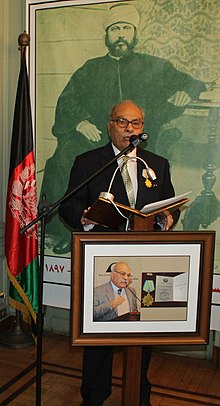This article needs additional citations for verification. (February 2020) |
Muhammad ʿImāra (8 December 1931, 1350 A.H. – 28 February 2020, 1441 A.H.[1]) was an Islamic thinker, an author and editor, as well as a member of al-Azhar's Academy of Islamic research in Cairo.[2][3]

Works
editMuhammad Imara authored "more than one hundred books on Islamic philosophy, the Quran, politics, and intellectual issues",[4] including:
- Tayarat al-fikr al-Islami [5]
- al-Tahrir al-Islamiy lilmar'ah
- al-Imam Muhammad 'Abduh: Mujadid al-dunya bitajdid al-din
- al-Islam wa huquq al-Insan: Darurat la Huquq
- al-Islām wa’l-ʿaqalliyyāt
- al-Gharb wa'l-Islam: ayn al-khatta' wa-ayn al-sawab?
See also
editReferences
edit- ^ "وفاة المفكر الإسلامي محمد عمارة.. وهذه وصيته - المصري اليوم". www.almasryalyoum.com. Retrieved 29 February 2020.
- ^ Hoigilt, Jacob (2013). "Situating Muhammad ʿImāra in the Islamic field". Islamist Rhetoric: Language and Culture in Contemporary Egypt. Routledge. pp. 107 ff. ISBN 9781136901072.
- ^ Wintle, Michael J. (2008). "Muhammad Imara". Imagining Europe: Europe and European Civilisation as Seen from Its Margins and by the Rest of the World, in the Nineteenth and Twentieth Centuries. Peter Lang. pp. 189 ff. ISBN 9789052014319.
- ^ John L. Esposito (ed.), The Oxford Dictionary of Islam, Oxford University Press, 2004, p. 18
- ^ Abu-Rabi', Ibrahim M. (1995). "Islamic Philosophical Expression in Modern Arab Society". Der Islam. 72 (1): 47–81. doi:10.1515/islm.1995.72.1.47.
See The Prophet's Pulpit: Commentaries on the State of Islam (Volume 1, page 193) by Khaled Abou El Fadl where he writes on and honors the life of Muhammad Imara.